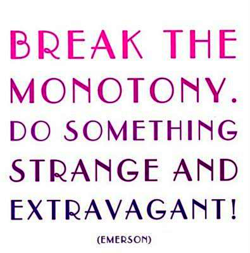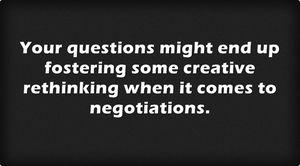Access Business Success Secrets for Effective Productivity
Please share this post on Twitter, Facebook, or any of your favorite social media sites. We welcome all comments. Thanks!Contributing Author: William Taylor
Sometimes, business deals can start to stagnate. Everyone knows everyone else’s tactics and anticipates them.
Nothing seems fresh anymore, and this might lead to resentment for people involved in the negotiations or just the negotiations in general.
It can be difficult to keep things exciting when there’s a lot of convincing and selling that need to be done, but it doesn’t have to be that way.
Looking at negotiations, and succeeding with them, doesn’t have to be boring.

With a little creative thinking, you can energize a meeting and still get the results you want out of your negotiation.
Today's post will reveal three valuable tips about using creativity to break new ground in deal-making processes.
1.) When negotiating, keep an open mind and adopt a little spontaneity.
One of the most common mistakes people make when entering into negotiations is that they are not willing to deviate from their prescribed course.
Whether this means they feel like they have to stick to a set of negotiation rules they’re accustomed to or they’re not willing to budge an inch when making a deal, this immovable stance can sometimes end with negative results.

One way of changing your thinking when it comes to making a deal is to adopt a little spontaneity.
This doesn’t mean you should say every thought you have or accept a deal without thinking it over.
What it does mean is that you should be willing to hear different points of view and deviate from your typical course of action if it will be beneficial.
The other party will appreciate this as well because it can allow you to find common ground and they’ll feel like you’re more receptive to changes that might need to be made that could end up benefitting you both.
2.) Slow down to let creative ideas flow for successful negotiations.
Another issue that prevents creativity is a quick execution of a negotiation.
When one party has the upper hand in a deal, the people may be primarily concerned about getting everything done as quickly as possible because they know they can.
Whether you are that party, or you’re on the receiving end of a more powerful group’s dealings, it’s important to slow things down a little bit.
This will allow more time for creative ideas to develop and flow, and this might result in some thoughts that are more beneficial to both parties than the original conditions and terms were.

Some people pride themselves on getting deals done efficiently, but you’ll never know what other options are available unless you stop to think about them. For this reason, it’s also better to never accept an offer right off the bat.
Give it some time, and allow people to voice their ideas.
Don’t be afraid to question what people say, even if you’re dealing with an authority figure. Keep it professional when you raise your points, and your questions might end up fostering some creative rethinking when it comes to negotiations.
Here are two resources to help guide you with a better understanding of effective negotiation.
- Nothing But Negotiation Free Video Series
- (Available via Amazon)
3.) Sometimes rules are made to be broken.
A willingness to break rules can sometimes be a helpful, creative way to make a deal.
This doesn’t mean its okay to break rules without consent, but it means that questioning policies and procedures and thinking about different ways to meet needs can be a creative way to solve problems.
Take Roger Reece, for example.

He was working for a company and wanted to go back to school for an MBA.
His corporate headquarters told him that he would have to pay the $40,000 tuition up-front and would be reimbursed half of the cost when he finished the program.
He asked numerous times for the company to pay it, because they wanted him to attend the program, but after several refusals Reece hit on a great idea.
Instead of paying the tuition, he was able to barter overstocked computers that were sitting around in his company’s warehouse, effectively paying his tuition with computers that went to the school’s IT department.
This is a great example of how someone was able to use his creativity to work out a deal that people told him couldn’t be done.
A little extra creative thinking can give you the spark you need to complete a deal in the most beneficial way.
Be open to change, take your time, and don’t be self-defeating by thinking that your ideas won’t be accepted when you haven’t even asked about them yet.
While it can take some time to modify your thought processes and gain cooperation from your colleagues, practicing creativity and being open to new ideas can produce great results in the long run.
Image Credits: linkedin, azmediator, BeSpontaneousNow

